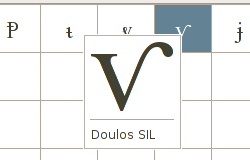If this had been posted on about any other day of the year, I’d have loved to check out the C++ version of The Mill on the Floss. (Yet another Victorian novel I never finished. Not yet anyway. Don’t take me wrong, I am very fond of Jude the Obscure and liked Wuthering Heights quite a lot. It’s a concentration issue, most likely).
But lacking this, at least there’s are real, existing translation of Lewis Carroll’s Jabberwocky into ActionScript. An excerpt (six lines’ worth, to be precise) goes thusly:
son.beware (jabberwocky);
son.beware (bird.jubjub);
son.shun (bandersnatch['frumious']);
sword.setType(vorpal);
var time = getTimer();
with (sword in hand) {
while (getTimer() < = time + 100000000) {
for (var i = 0; i <= foe.length; i++ ) {
if (foe[i] == 'manxome') {
break;
}
}
}
}
(Here is a collection of translations of the poem into human languages.)
In the French blogospheric segment, Jean Véronis treats us to a prime example of the genre, starting out with something so reasonable that it sure not to happen, and finishing on the topic of … “digitising”, or scanning, historical Google screenshots. Digitising, mon œil, as they say here. (I really should comment on Mark Liberman’s coverage (start here and follow the links backwards) of storm in that particular tea cup — a very small tea cup, I might say, but since it contains the French president, there may be some lasting effects.)
On the absolutely serious side, Eolas, a French law blogger (and ruthless capitalist, which is a tautology), prepares us for what is to come by explaining point for point how new popes are elected, as usual with a keen eye for the legal side of the matter. Truly a fo(u)nt of knowledge. His article reminds me of one of the best history books I’ve ever read, Mario Biagioli’s Galileo, Courtier. One point of maybe mostly anectotal interest, but which has stuck with me, was that even as late as in Galileo’s time, the time that the cardinals spent tucked away in the Sistine Chapel to elect a new pope used to be enough of a physical strain that several of them could be expected not to survive the ordeal. Which, in turn, gave the new pope the occasion to strengthen his own political faction.
Eolas, who professes himself a Catholic, deals with matters of religion in a refreshingly incisive tone. I particularly enjoyed his account of the lawsuit that recently got an advert censored in France because it supposedly insulted Catholic sensibilities (the imagery alludes to Leonardo da Vinci’s Last Supper and beyond that to the biblical passage, of course). Eolas first speaks as a lawyer (the judgement was slightly unusual in that it went against the prosecution’s opinion, which was that there was nothing wrong with the image), then as a Catholic. (For the record, while I am no great friend of advertising and don’t think that the ad’s ban is certainly no great loss for the art scene, I find it disturbing that a non-profit, which is affiliated with the official church hierarchy, succeeded in having it censored; and disappointed that they tried in the first place — but I’ve said before that I’m getting cynical about that.)
Update: On the topic of the first part of this post, I came across this post on linguaphiles, about an Austronesian relative of Basque. Much, much better than Google Gulp.
Related posts: Interview with New Orleans mayor Ray Nagin, uncensored, "Stateside marketability", Jonathan Strange & Mr. Norrell Seminar, Language power-games, Titre du jour, Reading Little Women, Little Women en V.F. : c'est la consternation
Technorati (tags): books, humour, langues du monde, livres, media, society, web


